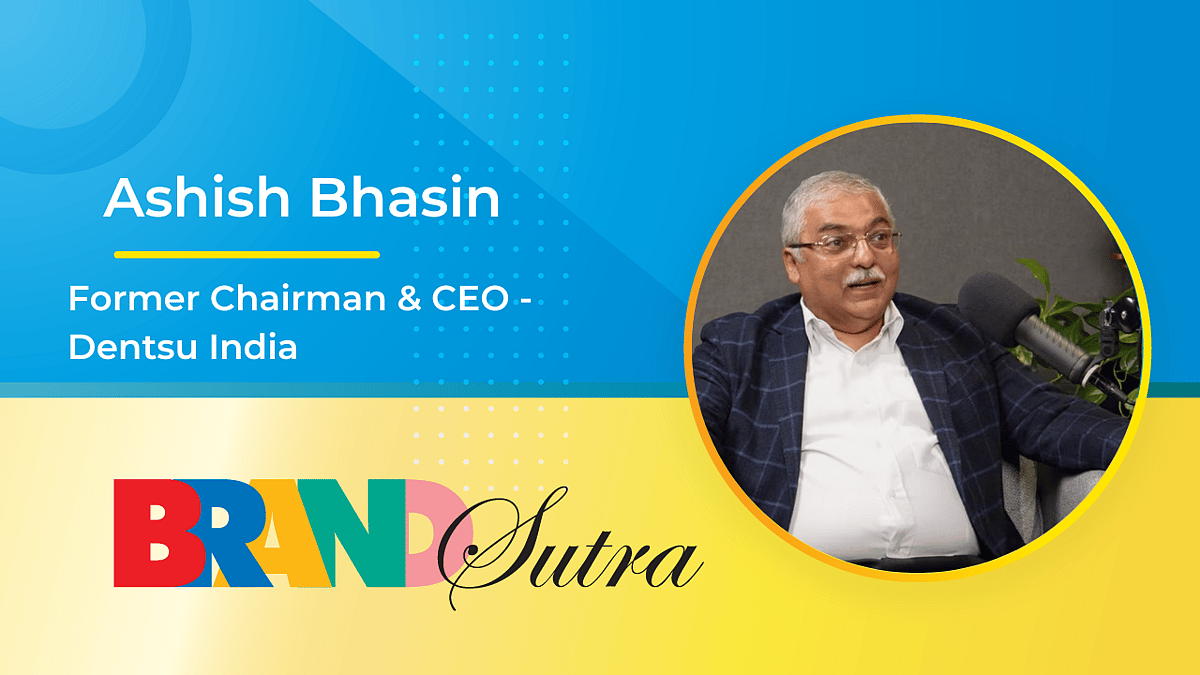From scouting for ‘the new Liril Girl’ around colleges in South Bombay to building Dentsu Aegis ground up with a focus on the galloping digital market, Ashish Bhasin’s conversation with Gautam Shelar is beyond insightful. Bhasin is the former Chairman & CEO of Dentsu India. Currently, he is the Founder of The Bhasin Consulting Group. Whether you’re an oldie in advertising looking to relive memories or a newbie that could use nuggets of wisdom and advice, the podcast has something for everyone. Watch it in its entirety on YouTube:
Edited excerpts…
How did you get into advertising?
I stumbled into it by accident. The real reason I entered advertising was its proximity—Lintas’ office was just a kilometer away from my home. Once I joined, I fell in love with both the profession and the company. Lintas, in those days, was a phenomenal organisation. Alyque Padamsee was the CEO, and Prem Mehta was running the show before eventually becoming CEO and Chairman. I spent 20 wonderful years there and enjoyed every moment.
What was advertising like back in the ‘80s?
I joined Lintas in 1988, in a very different era. The full impact of liberalisation hadn’t yet unfolded, though Rajiv Gandhi had initiated computerisation. Television was in its nascent stages, and print and cinema dominated advertising. I got the opportunity to work with Hindustan Unilever (HUL). Lintas and HUL, I think, was the university of marketing.
My classmates thought I was super lucky because one of the first jobs Alyque put me onto was to go find a new ‘Liril Girl’. After Karen Lunel, there was Sonali Mehta. And after she got married, we had to find a new Liril Girl. So I was in different restaurants and colleges, looking for her.
Then, when the concept of rural marketing came in, we needed to go out in the field and gain insight. I was marched off to a village called Eta in Eastern Uttar Pradesh, where I lived for about 10 days. That laid the foundation for Linterland—Lintas’ rural marketing specialist wing.
There was an era of advertising where people were from South Bombay air-conditioned offices trying to sell soap in villages. But it takes a lot of market visits and interacting with the consumer to get it right. For example: you may start off by thinking that you need to talk down to the rural consumer. But actually, the rural consumer is smarter than the urban consumer. They are a lot more value conscious. You and I will not know our ‘cost per bath’ or even the cost of the soap we use. But a rural consumer will know exactly what each bar of soap costs and how long it will last them.
Tell us about your transition into leadership roles.
My first leadership role was as the CEO of Lintas, Madras. It was a low performing agency but with a lot of potential and very good clients. As a branch manager, you’re responsible for everything—from cleanliness to profitability. Within two years, we made the branch highly profitable and won Agency of the Year. That was my first independent leadership role, and I matured tremendously during that period.
When you’re an account director, your whole focus is the brand, the client and the assignment on hand. As you start going more into the general management roles or leadership roles, a lot of your time goes on people management and situation management.
What do you think is the key to success in advertising?
Many would say creativity or people skills, and while those are important, the true key is the ability to withstand stress. Advertising is relentless. You have to bring your A-game every single day, not just once in a while. If you can consistently perform at your peak over decades, you will undoubtedly reach the top.
Talk us through your journey building Aegis Media and Dentsu.
When I took over Aegis, it was poorly performing with about 30 people in the team. In about 11 years, we grew from there to 3,500 people. WPP and Interpublic Group had already been in the market for close to a century. We realised that if we were going to do the same thing as our competitors, we would lose that game.
I always believed in the potential of digital even though at the time, it was only 2% of the market. I had seen how digital was galloping in Southeast Asia. We had launched Isobar but realised that if we relied only on organic growth, it would take too long. So, I aggressively pursued acquisitions. We acquired Communicate2 and then many other acquisitions followed. So while the other agencies focused on TV and print, I prioritised digital and outdoor. Exactly six years later, digital had already grown to 1/4th of the market.
That momentum helped the other business too. We started something called ‘One P&L’ where once a client became part of the Dentsu family, they had access to all our incredible talent including Taproot and Dentsu Webchutney.
What’s your advice to young professionals?
Don’t chase money in the short term—focus on being the best at what you do. If you do that consistently, success money and recognition will follow. It is easy to be the best once. But to do that over 30-40 years is where the challenge is. The pace of change is rapid and staying ahead requires continuous learning and adaptation.
